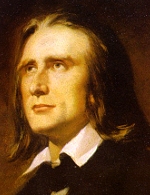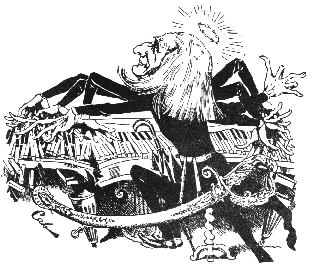|
Xtend
 Listen
Listen
 Period
Period
 Country
Country
 Notes
Notes
 Quotation
Quotation
 Dictionary
Dictionary
 Projects
Projects
 Finders
Finders
|
Born: 22 October
1811, Raiding, Hungary
Died: 31 July 1886, Bayreuth, Germany
 Liszt,
Ferencz Liszt,
Ferencz
Among the great piano virtuosos,
and one of the most evidently Romantic composers. As early as the age of 11, his mature playing won Beethoven's
composers. As early as the age of 11, his mature playing won Beethoven's admiration, and later on he continued performing and accumulating both
money and almost hysterical fans everywhere he performed (a film called
"Lisztomania"
admiration, and later on he continued performing and accumulating both
money and almost hysterical fans everywhere he performed (a film called
"Lisztomania" with Roger Daltry as Liszt presented this
amazing adoration).
with Roger Daltry as Liszt presented this
amazing adoration).
 As
a child, he moved to Vienna As
a child, he moved to Vienna ,
where he studied piano from Czerny ,
where he studied piano from Czerny and composition from Salieri
and composition from Salieri .
After 2 years, he moved with his family to Paris .
After 2 years, he moved with his family to Paris ,
where he became friends with Berlioz ,
where he became friends with Berlioz and Chopin
and Chopin ,
and became a fascinating, innovative composer ,
and became a fascinating, innovative composer .
His importance as a composer is enormous, for he
developed the symphonic poem .
His importance as a composer is enormous, for he
developed the symphonic poem ,
one of the important forms Romanticism ,
one of the important forms Romanticism contributed to the history of music. The essence of symphonic poem is a
musical piece presented as a single unit rather than separate symphony
movements. In addition, a symphonic poem tells a story or an extra-musical
experience such as an image, a song or even a patriotic idea (Smetana's
contributed to the history of music. The essence of symphonic poem is a
musical piece presented as a single unit rather than separate symphony
movements. In addition, a symphonic poem tells a story or an extra-musical
experience such as an image, a song or even a patriotic idea (Smetana's "My Fatherland", for instance).
The introduction of extra-musical elements into musical composition
"My Fatherland", for instance).
The introduction of extra-musical elements into musical composition is understood in Liszt's work: he was interested in prose, poetry and painting,
and influenced by all those arts. He was also affected
by Paganini's
is understood in Liszt's work: he was interested in prose, poetry and painting,
and influenced by all those arts. He was also affected
by Paganini's virtuosity on the violin
virtuosity on the violin ,
writing music in a similar style for piano ,
writing music in a similar style for piano  and arranged some of his works for the piano. "Waltz
Mephisto" is an example of his writing, but also the Piano
Concerti no. 1 and 2 and "Faust"
Symphony.
and arranged some of his works for the piano. "Waltz
Mephisto" is an example of his writing, but also the Piano
Concerti no. 1 and 2 and "Faust"
Symphony.
 The
old Liszt, unlike the young star, was possessed by Hungarian The
old Liszt, unlike the young star, was possessed by Hungarian patriotism (the "Hungarian Rhapsodies"
he wrote throughout the years will bear witness to this), religious faith
(retiring to Rome
patriotism (the "Hungarian Rhapsodies"
he wrote throughout the years will bear witness to this), religious faith
(retiring to Rome ,
he turned again to religion and became a priest), and he helped young musicians
a great deal, among them Wagner ,
he turned again to religion and became a priest), and he helped young musicians
a great deal, among them Wagner ,
who even married his daughter Kozima. Like
Wagner, he made extensive use of the "leitmotif" ,
who even married his daughter Kozima. Like
Wagner, he made extensive use of the "leitmotif" technique (a guiding motif appearing over and over within a piece).
technique (a guiding motif appearing over and over within a piece).


Liszt on the WWW
 Sites
Sites
|
 Audio
Audio
|
 Video
Video
|
 Images
Images
|
 MIDI
MIDI
|
|
Description
He played

He Was

He Lived in the
 Romantic period
Romantic period
In
 Hungary
Hungary
Visit the
 Liszt Ferenc
Memorial Museum in Budapest
Liszt Ferenc
Memorial Museum in Budapest
|